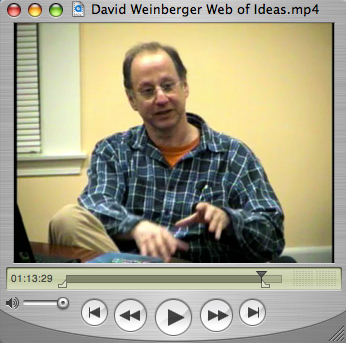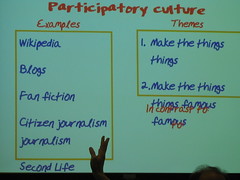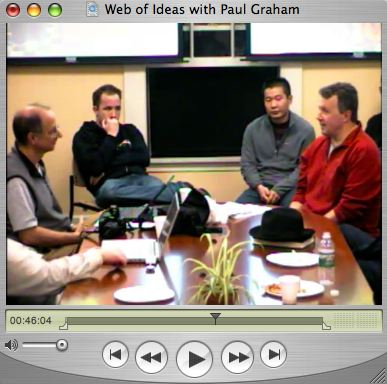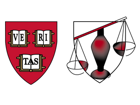Posts filed under 'Web of Ideas'

Click To Play Video
Web of Ideas with David Weinberger, March 21, 2007.
Thanks to the pliability of bits and the connectedness of the Net, we’re now able to participate in our culture like never before. We can create a video and post it at sites like YouTube. We can watch a video and comment on it, tag it, link to it, mash it up with another video. We can build massive encyclopedias together. We can form clans to play games. We can build an island in SecondLife where we can interact in a world we’ve created together. But, is this burst of participation in culture leading to greater participation in politics and democracy? If so, what are the connecting points?
This video features David Weinberger leading a Web of Ideas discussion at the Berkman Center to explore these and other questions.
Runtime: 1:20:56, size: 320×240, 225mb, QuickTime .MP4, H.264 codec
March 28th, 2007

Web of Ideas with David Weinberger, March 21, 2007.
 Download the audio podcast (time: 1:20:56).
Download the audio podcast (time: 1:20:56).
Thanks to the pliability of bits and the connectedness of the Net, we’re now able to participate in our culture like never before. We can create a video and post it at sites like YouTube. We can watch a video and comment on it, tag it, link to it, mash it up with another video. We can build massive encyclopedias together. We can form clans to play games. We can build an island in SecondLife where we can interact in a world we’ve created together. But, is this burst of participation in culture leading to greater participation in politics and democracy? If so, what are the connecting points?
On this edition of AudioBerkman, we’ll hear David Weinberger leading a Web of Ideas discussion at the Berkman Center to explore these and other questions.
March 26th, 2007

Click To Play Video
Berkman Fellow David Weinberger interviews Paul Graham, software guru, entrepreneur, essayist and painter.
In a recent essay, “Taste for Makers,” Paul argues that successful design, from math to software to painting, relies on the same aesthetic principles. Taste is therefore not a matter of subjectively appreciating fine works but is a required capability for creating great software. But is taste as timeless as Paul suggests? Do the design principles Paul points to result from aesthetic or functional characteristics? And why should we think that the visual and the programmatic, the artistic and the functional, the physical and the virtual might all be beautiful in similar ways?
Produced by Indigo Tabor and Colin Rhinesmith.
November 9th, 2006
 Berkman Fellow David Weinberger interviews Paul Graham, software guru, entrepreneur, essayist and painter.
Berkman Fellow David Weinberger interviews Paul Graham, software guru, entrepreneur, essayist and painter.
In a recent essay, “Taste for Makers,” Paul argues that successful design, from math to software to painting, relies on the same aesthetic principles. Taste is therefore not a matter of subjectively appreciating fine works but is a required capability for creating great software. But is taste as timeless as Paul suggests? Do the design principles Paul points to result from aesthetic or functional characteristics? And why should we think that the visual and the programmatic, the artistic and the functional, the physical and the virtual might all be beautiful in similar ways?
 Download the MP3 (time: 1:19:07).
Download the MP3 (time: 1:19:07).
Produced by Indigo Tabor and Colin Rhinesmith.
November 9th, 2006
 In this Web of Ideas podcast, Berkman Fellow David Weinberger talks with AKMA (AKA A.K.A. Adam), author of the new book, Faithful Interpretation: Reading the Bible in a Postmodern World.
In this Web of Ideas podcast, Berkman Fellow David Weinberger talks with AKMA (AKA A.K.A. Adam), author of the new book, Faithful Interpretation: Reading the Bible in a Postmodern World.
AKMA in his book maintains that it’s clear that even the most thoughtful, sincere, learned people may be radically divided about how to interpret scripture. Therefore, he concludes, we need a way of understanding interpretation that does not insist that only one of those thoughtful, sincere, learned people can be right. This understanding of interpretation would embrace and delight in difference. But can that insight help us understand how to live on the Web where the differences are also not going away? If so, what do we do about the fact that while more than one interpretation may be right, some are definitely wrong?
 Download the MP3 (time: 45:46).
Download the MP3 (time: 45:46).
Produced by David Weinberger.
November 4th, 2006

David Weinberger hosted another evening in his Web of Ideas series. This week’s topic is “Messiness as a Virtue” — an open discussion on the importance of orderliness in knowledge.
If you’d like to receive weekly email announcements of Berkman Center events and webcasts, or other Berkman Center notices, please sign up here.
Download the MP3 (time: 1:21:11)
Please note: there is a break in the recording for a few seconds at 3 min 19 sec.
May 5th, 2006
 Earlier this week, Berkman Center fellow, author, and blogger David Weinberger hosted a discussion about “The Authority of Wikipedia” as part of his occasional Web of Ideas series. From David, “An article gains authority just by appearing in the Encyclopedia Britannica. Does it gain authority just by being in Wikipedia? What (if anything) makes a Wikipedia article worthy of belief? How are the sources, criteria and locus of authority changing in the age of the Web?”
Earlier this week, Berkman Center fellow, author, and blogger David Weinberger hosted a discussion about “The Authority of Wikipedia” as part of his occasional Web of Ideas series. From David, “An article gains authority just by appearing in the Encyclopedia Britannica. Does it gain authority just by being in Wikipedia? What (if anything) makes a Wikipedia article worthy of belief? How are the sources, criteria and locus of authority changing in the age of the Web?”
Download the MP3 (time: 1:19:06)
March 17th, 2006
 David Isenberg, new Berkman Fellow and author of the seminal paper “The Rise of the Stupid Network,” talks about why the best network is the one that has the least intelligence in it, as well as about the current state of affairs of the telecommunications industry. This is the first session of the new year of “Web of Ideas” discussions led by Berkman Fellow David Weinberger.
David Isenberg, new Berkman Fellow and author of the seminal paper “The Rise of the Stupid Network,” talks about why the best network is the one that has the least intelligence in it, as well as about the current state of affairs of the telecommunications industry. This is the first session of the new year of “Web of Ideas” discussions led by Berkman Fellow David Weinberger.
Download the MP3 (time: 49:10)
March 9th, 2006
Meta
License

Unless otherwise noted this site and its contents are licensed under a Creative Commons Attribution 3.0 Unported license.


 Download the audio
Download the audio 
 Berkman Fellow
Berkman Fellow  In this Web of Ideas podcast, Berkman Fellow
In this Web of Ideas podcast, Berkman Fellow 

